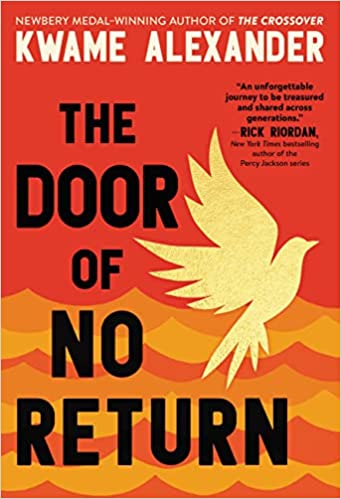Door of No Return
 The Door of No Return
The Door of No Return
Fiction / Ages 10-18 / Ghana
Little Brown
2022
432

"A novel in verse about an Asante boy who is captured and taken from his village during the nineteenth century."--
When I was 8 years old, my mother introduced me to slave narratives with Meet Addy, the story of the black enslaved girl in the American Girl Book Collection. It was one of the first times I read about slavery from the perspective of a young child, and it had such an impact on me that it inspired me to read more challenging works by Sojourner Truth, Frederick Douglass, Equiano, and other authors. I believe my interest in postcolonial issues was first sparked at a young age by my introduction to Meet Addy.
Many many years on and I find myself enmeshed in the life of another young character during the time of the Trans-Atlantic Slave Trade but this time, I was not prepared for what was coming. The Door of No Return chronicles the life of a bright 11-year-old growing up in Asante territory on the colonial Gold Coast. This stirring tale moves from the everyday life of a young boy who challenges his haughty cousin to a swim-off to the terrifying incidents of capture, detention, sale into enslavement, and the journey to an uncharted land. Despite the fact that it ends on a hopeful note, one cannot deny how devastating the activities of enslavement has been on the people. I find it particularly terrifying how quickly someone’s status could change from being an ordinary human to being enslaved. A village is having a commemorative event one minute, and marauders are stealing children on the river banks the next.
As a poet, Alexander offers readers a smooth novel in verse that carries us along without leaving us with a sense of unfinished business. This writing style works well because it uses fewer words to convey ideas to the reader more succinctly and directly than does conventional prose. Additionally, the language and flow are praiseworthy; the hypnotic combination of local Asante words, culture, rhythm, lyricism, storytelling, and expression and description. It hurts me that I could not experience this in audio form because that would be such a delicious experience (I highly recommend this in audio). This is my introduction to Kwame Alexander and I must admit that I am sold!
The protagonist’s internal monologue and the fundamental human motivations of love and ego advance the plot. Kofi, who battles the dualistic nature of his society—a legacy of colonialism—is a person who is simple to fall in love with. He does not grasp the reasoning behind his teacher’s insistence that he speak English rather than his native Twi which constantly lands him in trouble. For a young boy, he is incredibly inquisitive and frequently has insightful discussions with his grandfather, Nana Mosi, while playing the game Oware. He observes events around him in an odd way, which influences his dreams and his capacity for storytelling, both of which are later useful.
The importance of friendships, community, issues relating to European colonialism and the slave trade in Africa are just a few of the many topics Alexander addresses. What he does so well is present the humanity of the enslaved by telling their version of events prior to being captured, sold and treated like lesser than. Kofi, his older brother Kwasi, and friends Owu, and Afua were people who had their future aspirations cut short by the selfishness and greed of some men. Even for a children’s book, The Door of No Return portrays the trauma that Kofi and the others enslaved go through in a way that is unsettling and not so easy to swallow.
Considering how significant rivers were to communities in the past, it is also intriguing that Alexander uses the Offin river as a leitmotif of place. It serves as a hub for activities like gossip, entertainment, and housework. Regrettably, the Offin River’s present condition, which is largely the result of galamsey, or illegal gold mining, leaves much to be desired. This current generation has been deprived of the benefits that the characters in The Door of No Return enjoyed. Alexander deserves praise for including this and demonstrating how much the Ghanaian people continue to pay for the exploitation of our natural resources.
I could go on and on about all the things I adore, but one that brings me comfort is the relationships that have developed throughout this text. Every stage of Kofi’s life is interspersed with friendships, and each relationship serves the purpose. For instance, his friends Ebo and Ama support him through his struggles at home and at school. In the harrowing times of being captured, his bonds with Owu and Afua keep him going. Their shared interests and struggles bring comfort to them and keep hope alive.
I thoroughly enjoyed this book! It accomplished for me what many slave narratives have not been able to do recently. One wish, because I am biased towards speculative writing, a part of me wanted some elements of speculative writing incorporated here. Although the novel mentions some local speculative stories – told to scare the children – I would have appreciated more magic and fantasy in the plot itself. That’s just me wishing to have it all. This is an easy 5 star rating! I can’t wait for the promised sequel. The first book has already become a classic.
Elizabeth Abena Osei, MA
University of Ghana
Published in Africa Access Review (February 22, 2023)
Copyright 2023 Africa Access
